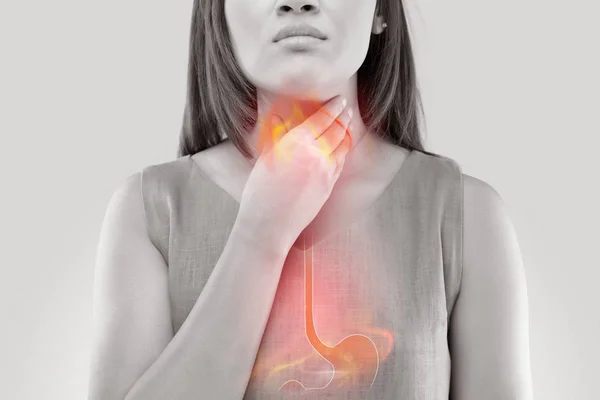Share this @internewscast.com
Feeling the discomfort of heartburn can interfere with everyday activities, so it’s important to understand what causes it and learn ways to manage it. Gastroesophageal reflux disease (GERD) is a common issue that many people face, causing symptoms like heartburn and acid reflux. By getting to know more about GERD and adopting practical self-care tips, people can help relieve their discomfort and improve their overall well-being.

What Is Gastroesophageal Reflux Disease?
GERD happens when stomach acid frequently moves back up into the esophagus, which is the tube that connects your mouth to your stomach. This backward flow, also known as reflux, can irritate the lining of the esophagus, leading to signs such as heartburn, regurgitation, and trouble swallowing. According to Dr. Prateek Sharma, a professor at the University of Kansas School of Medicine and head of the American Society for Gastrointestinal Endoscopy, GERD is a worldwide issue. Studies show that around 20-30% of people in India experience the symptoms of GERD.
5 Gastroesophageal Reflux Disease Self-Care Tips
Managing GERD effectively often involves lifestyle and dietary adjustments. Here are five self-care strategies to help alleviate symptoms:
- Modify Eating Habits: Consuming smaller, more frequent meals can prevent the stomach from becoming overly full, reducing the likelihood of acid reflux. It’s also advisable to eat slowly and avoid lying down immediately after meals.
- Identify and Avoid Trigger Foods: Certain foods and beverages, such as fatty or fried items, chocolate, caffeine, alcohol, and spicy foods, can exacerbate GERD symptoms. Keeping a food diary can help identify personal triggers.
- Maintain a Healthy Weight: Excess weight, particularly around the abdomen, can increase pressure on the stomach, pushing acid into the esophagus. Achieving and maintaining a healthy weight can significantly reduce GERD symptoms.
- Elevate the Head During Sleep: Raising the head of the bed by about 6 to 9 inches can prevent acid from flowing back into the esophagus during sleep. This can be achieved by placing blocks under the bedposts or using a wedge pillow.
- Quit Smoking and Limit Alcohol Consumption: Smoking can impair the function of the lower esophageal sphincter, while alcohol can increase stomach acid production. Both factors contribute to the worsening of GERD symptoms.
Do Natural GERD Treatments Work?
Many people are interested in natural treatments for GERD, like herbal teas, probiotics, and supplements. Although some research points to possible benefits, the results are not definitive. For example, a study found in the National Center for Biotechnology Information suggests that certain herbal remedies might help ease GERD symptoms, but more research is necessary to verify their effectiveness and safety. It’s important to speak with a healthcare professional before trying any natural treatments to make sure they won’t conflict with other medications or health conditions.
When to See a Doctor for GERD Treatment
While self-care measures can effectively manage mild GERD symptoms, medical attention is necessary if:
- Symptoms persist despite lifestyle modifications and over-the-counter medications.
- Difficulty swallowing or pain when swallowing occurs.
- Unintended weight loss or persistent nausea and vomiting are experienced.
- Symptoms are severe or occur frequently, impacting daily life.
According to the Mayo Clinic, seeking prompt medical evaluation is essential to prevent potential complications, such as esophageal damage or precancerous changes.
In conclusion, understanding GERD and implementing targeted self-care strategies can significantly alleviate heartburn and acid reflux symptoms. However, it’s important to recognize when professional medical intervention is necessary to ensure comprehensive care and prevent complications.
Also Read | Always Feeling Hungry? 5 Common Reasons and Expert Tips to Stay Full Longer

















